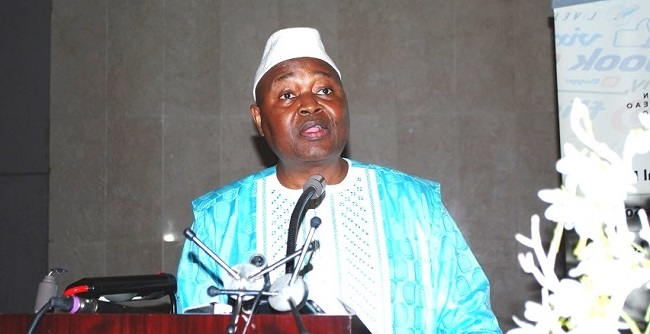Ambassador Conteh praises ECOWAS

Ambassador Conteh speaks at the ECOWAS anniversary celebrations
Liberia’s ambassador to Nigeria Prof. Al-Hassan Conteh says despite the current security and financial challenges facing the Economic Community of West African States (ECOWAS), there is much that the sub-region of over 300 million people can be thankful for.
Ambassador Conteh made the assertions on Friday, June 10, in Abuja, the Nigerian capital during the official celebration of the 41st anniversary of ECOWAS.
The sub-regional bloc turned 41 on May 28, but official observance was pushed to a later date due to other major activities.
Prime among them was the holding of the 49th Ordinary Session of the Summit of the Authority of Heads of State and Government which held in the Senegalese capital Dakar that witnessed the President of Liberia, Her Excellency Madam Ellen Johnson Sirleaf emerging as ECOWAS’ new Chairperson.
In his special remarks during Friday’s event held at the ECOWAS Commission in Abuja, Amb. Conteh congratulated both President Sirleaf, the ECOWAS’ new chairperson and Marcel Alain de Souza, the new President of the ECOWAS Commission as well as the incoming team of commissioners for their preferment.
Amb. Conteh, also the permanent representative of Liberia to ECOWAS, stated that ECOWAS’ record over the last four decades since its founding in meeting its goal of economic development and regional integration is worth celebrating.
“Since ECOWAS launched Vision 2020 to transform ECOWAS from ECOWAS of States to ECOWAS of Peoples, our Community has accomplished meaningful targets and objectives in its strategic planning. Among these is the adoption of a common passport for the free movement of Community citizens in Member States”, he added.
He asserted that progress has been made in trade liberalization, customs union, favorable industrial policy, mines development, agriculture and environment, infrastructure-transport, telecommunications and energy.
Amb. Conteh also noted the considerable progress that has been made in ECOWAS’ plan to establish a single currency by 2020 and the adoption of a single biometric identity card.
He acknowledged ECOWAS’ mediation which has made a big difference in resolving civil wars in his own country Liberia and neighboring Sierra Leone and Cote d’Ivoire and more recently the sub regional bloc’s role in the resolution of crises in Burkina Faso, Guinea Bissau, and Mali.
Also speaking, the President of the ECOWAS Commission Marcel de Souza stressed the importance for the finalization of the establishment of the institutional framework for implementation of the Economic Partnership Agreement (EPA).
“All this will only then be possible, thanks to the regulation of competition in the ECOWAS region. From then on, the creation of the Regional Authority of ECOWAS competition has proved necessary,” he stated in his remarks.
Earlier, Professor Amadu Sesay of Nigeria’s University of Ilorin lectured on the theme: “ECOWAS and Peace Support Operations in West Africa: Opportunities and Threats”.
Prof. Sesay argued that at length elsewhere from a purely economic integration scheme, ECOWAS mutated into what he termed as a veritable security community.
He said the 1990s provided opportunities for ECOWAS to promote peace and stability in West Africa: “No other region has achieved such a feat in Africa; that is, the last inter-state border skirmish in West Africa was in 1984, between Mali and Burkina Faso, and was quickly brought under control”.
Prof. Sesay also recalled how ECOWAS has played critical roles in the region as ‘legitimizer’, ‘bridge-builder’, ‘unifier’, ‘fund raiser’ and ‘moral guarantor’ of peace agreements unilaterally and in collaboration with development partners like the UN, EU, UK, US and successfully restored peace and stability in some member states.
He, however, named weak national economies and increasing numbers of the absolute poor among the citizens, massive youth unemployment in a region characterized as a ‘youth bulge’, religious fundamentalism, intolerance and terrorism exacerbated by linkages and allegiance to groups within and outside the African continent when ccommenting on the challenges and threats facing the sub regional bloc.
“This could have serious implications for free movement of people within the region, one of the major achievements of ECOWAS”, he observed.
Prof. Sesay also named health pandemics, like the recurrence of ebola, lassa fever, hiv/aids, the zika virus and malaria, among others as challenges and threats to the sub region.
He was however quick to note that these threats and challenges could be turned into opportunities if they are recognized early enough and appropriate responses are put in place to neutralize them.
Nat Bayjay

